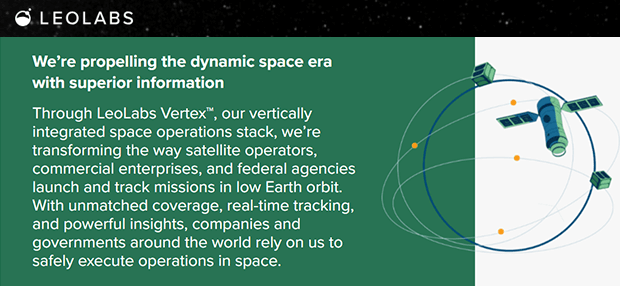
LeoLabs has recently secured $29 million in funding to enhance its space tracking capabilities, aiming to address the critical challenge of space debris. This investment will fuel technological advancements and global collaboration, significantly improving space safety standards. With a focus on innovation and sustainability, LeoLabs is poised to lead the effort in ensuring a safer environment for space exploration and commercial activities.
Introduction: A Giant Leap for Space Safety
In an era where space debris poses a significant threat to satellites and human spaceflight, LeoLabs‘ mission to enhance space safety and debris tracking has never been more critical. The recent acquisition of $29 million in funding marks a pivotal moment for the company, promising to revolutionize space tracking capabilities and ensure the long-term sustainability of space operations.
Unpacking the Funding: Behind the $29 Million Boost
This substantial financial injection comes from a consortium of visionary investors, including space-focused venture capital firms and strategic partners. The diversity and caliber of these investors underscore a robust confidence in LeoLabs’ mission and its technology’s potential to mitigate space debris risks. This round of funding not only eclipses previous investments but also sets a new precedent for the valuation and support of space safety initiatives.
Expanding Horizons: What the Funding Means for LeoLabs
With this newfound capital, LeoLabs outlines an ambitious roadmap for expansion. The company plans to:
- Enhance its global network of radar systems, increasing the coverage and accuracy of space debris tracking.
- Invest in advanced algorithms and computing infrastructure to improve the speed and reliability of collision avoidance services.
- Expand its team of engineers and space scientists to accelerate research and development efforts.
These initiatives are designed to solidify LeoLabs’ position as a leader in space safety, offering unparalleled services to satellite operators, governmental agencies, and other stakeholders in the space sector.
The Future of Space Surveillance: Innovations on the Horizon
The funding will fuel a series of technological advancements aimed at setting new standards in space surveillance. Key areas of innovation include:
- Development of next-generation radar technology capable of detecting smaller debris with greater precision.
- Implementation of machine learning algorithms to enhance predictive analytics for collision avoidance.
- Launch of new satellite tracking services tailored to the emerging needs of the satellite industry, including the rapidly growing constellation operators.
These advancements promise to significantly enhance the global community’s ability to monitor and manage space debris, ensuring the safety and sustainability of future space operations.
Recommended: Revolutionizing Code-Free App Creation With Canonic
The Global Impact: Enhancing Space Safety and Collaboration
LeoLabs’ expansion and technological advancements are set to have a profound impact on international space safety standards and collaborations. By providing more accurate, timely, and accessible space debris tracking data, LeoLabs is at the forefront of fostering a safer space environment. This initiative not only benefits satellite operators by reducing the risk of collisions but also aids in the formulation of global policies and agreements aimed at space sustainability.
The enhanced capabilities brought about by this funding will encourage greater international cooperation. Countries and organizations worldwide can leverage LeoLabs’ data and services to coordinate their space activities more effectively, ensuring a collective approach to managing space traffic and debris.
Challenges and Opportunities: Navigating the Space Debris Dilemma
The issue of space debris represents one of the most pressing challenges in the realm of space safety. With millions of pieces of debris orbiting Earth, the risk of collisions with satellites and manned spacecraft has escalated. LeoLabs’ efforts are critical in addressing this challenge, offering solutions that enable more effective tracking and management of debris.
This funding opens up numerous opportunities for LeoLabs, including:
- Establishing partnerships with governmental and international space agencies to develop comprehensive space safety protocols.
- Engaging in cutting-edge research to explore new methods for debris mitigation and removal.
- Influencing global space policy through the provision of empirical data and expert analysis.
Eyes on the Universe: A New Era of Space Exploration
As humanity stands on the brink of a new era in space exploration, the importance of sustainable and safe practices has never been more apparent. LeoLabs’ work, empowered by this recent funding, is instrumental in paving the way for future missions, ensuring that space remains a viable and safe frontier for exploration, innovation, and commercial activity.
The company’s commitment to enhancing space safety extends beyond immediate commercial interests, contributing to a legacy of responsible space utilization that will benefit generations to come.
Beyond the Horizon: Charting the Future of Space Safety
In conclusion, LeoLabs’ recent $29 million funding milestone is more than a financial achievement; it’s a significant step forward in the quest for enhanced space safety and sustainability. As LeoLabs continues to expand its capabilities and innovate, the global space community stands to benefit from improved space debris tracking and management, fostering a safer environment for all space activities.
The future of space exploration and utilization hinges on our ability to navigate the challenges posed by space debris. With LeoLabs leading the charge, there’s renewed hope for a collaborative, sustainable approach to preserving the final frontier for future explorers and innovators.
Please email us your feedback and news tips at hello(at)techcompanynews.com

